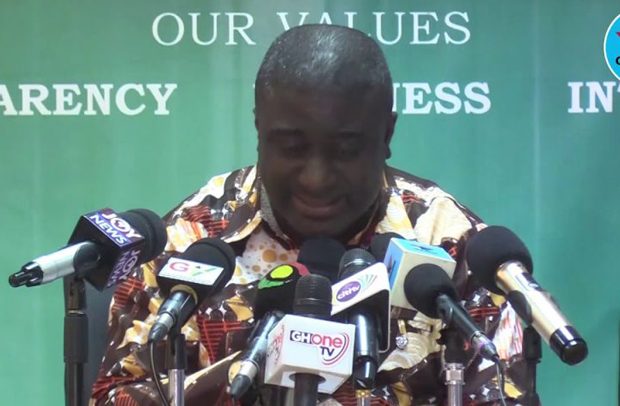Dr. Eric Bossman Asare addressing the media
Four million, four hundred and forty-five thousand, three hundred and forty-six (4,445,346) Ghanaians have so far registered as voters since the registration exercise by the Electoral Commission (EC) started on June 30.
Dr. Eric Bossman Asare, Deputy Chairman in charge of Corporate Affairs, disclosed this while addressing the media during its third session of the ‘Let The Citizen Know’ series in Accra yesterday.
Greater Accra Leads
He said “the Greater Accra Region leads with 20.9% of the registered voters followed by the Ashanti Region with 18.4%.”
“The Eastern Region is at distant third at 9.5% and the Central Region at 9.4%,” he added.
The North East Region is, however, at the bottom with 1.7% registered voters.
Regional Breakdown of Registered Ghanaians
The Greater Accra region tops with a figure of 929,366 followed by the Ashanti Region which has so far recorded 816,481.
The Eastern Region has recorded 421,467, followed by the Central Region, with 415,799.
The rest are the Western Region, 287,222 ; Volta Region, 274,063; Northern Region, 254,575 ; Bono, 177,434; Bono East, 163,680; Upper East, 147,365; Western North, 117,062; Upper West, 115,281; Ahafo Region, 86,498; Oti, 83,799; Savannah, 78,410; and North East, 76,854.
Challenged Cases
The Greater Accra Region he said topped in terms of challenged cases.
He, however, said “as a percentage of the total registered voters in each region, the Oti Region leads with 0.5%, followed by Ahafo at 0.42% and Volta at 0.39%. The region with the least percentage of challenged cases is Bono with 0.02%.”
Should the current trend continue, the deputy chairperson said “the Greater Accra Region alone will constitute more than 20% of the total registered voters in the country,” adding that “the increasing numbers from the Central Region are a clear indication of population shift from Greater Accra towards the Awutu, Effutu and Gomoa areas of the Central Region.”
Though the commission still has another four weeks of registration period, there are patterns that are clearly pointing to regions where population is declining and those that are seeing an increase in population, Dr. Bossman indicated.
He stressed that “the 4,445,346 registered Ghanaians constitutes almost 30% of the projected figure of 15 million the EC is likely to register,” explaining that in the next few weeks “we are anticipating to register about 10.5 million people.”
Overview
With the average time for registering applicants being about four minutes, he said “these points to improvement by officials engaged in this segment of the exercise.”
COVID-19 Protocols
He announced that “the commission is satisfied with the significant improvements in the adherence to the Covid-19 safety protocols, especially social distancing. This has been achieved through the provision of chairs for queue management in all our registration centres.”
Party Anomalies
He said the commission had observed a trend by which “some agents of political parties at the registration centres collect the voter ID cards of applicants and take some details from the cards including asking for applicants’ phone numbers.”
The deputy chairperson stressed “this is not part of our electoral laws, and the agents of political parties should desist from doing that. Members of the general public are also advised not to give their voter ID cards issued to them by the commission to the agents of the political parties at the registration centres.”
Transporting People
Parliamentary candidates and operatives of political parties should desist from transporting people from one district to the other to register when they know very well that these people are not residents of the districts where they want to register, Dr. Bossman said.
He also asked operatives of political parties not to defend people who are not Ghanaians, adding “the commission needs the support of all our stakeholders for a clean register.”
Registration in Secondary Schools
Following the recent registration of SHS students by the commission, he said “it is still looking at the option of going back to these schools in the course of the week to register those who did not have the chance to register. This is because reports coming to the EC indicate that in most of the schools the team could not even register 50% of them.”
Mop-Up
The mop-up segment of the exercise, he said, would ensure that qualified persons who could not be registered during the main phases are given the opportunity to do so.
More Centres
The current phase which began on Sunday and will end on Friday has registration taking place in 6,728 registration centres and in the 267 district offices of the commission.
This is a ramped-up effort which has seen the doubling of registration centres.
By A.R. Gomda


